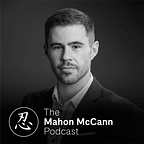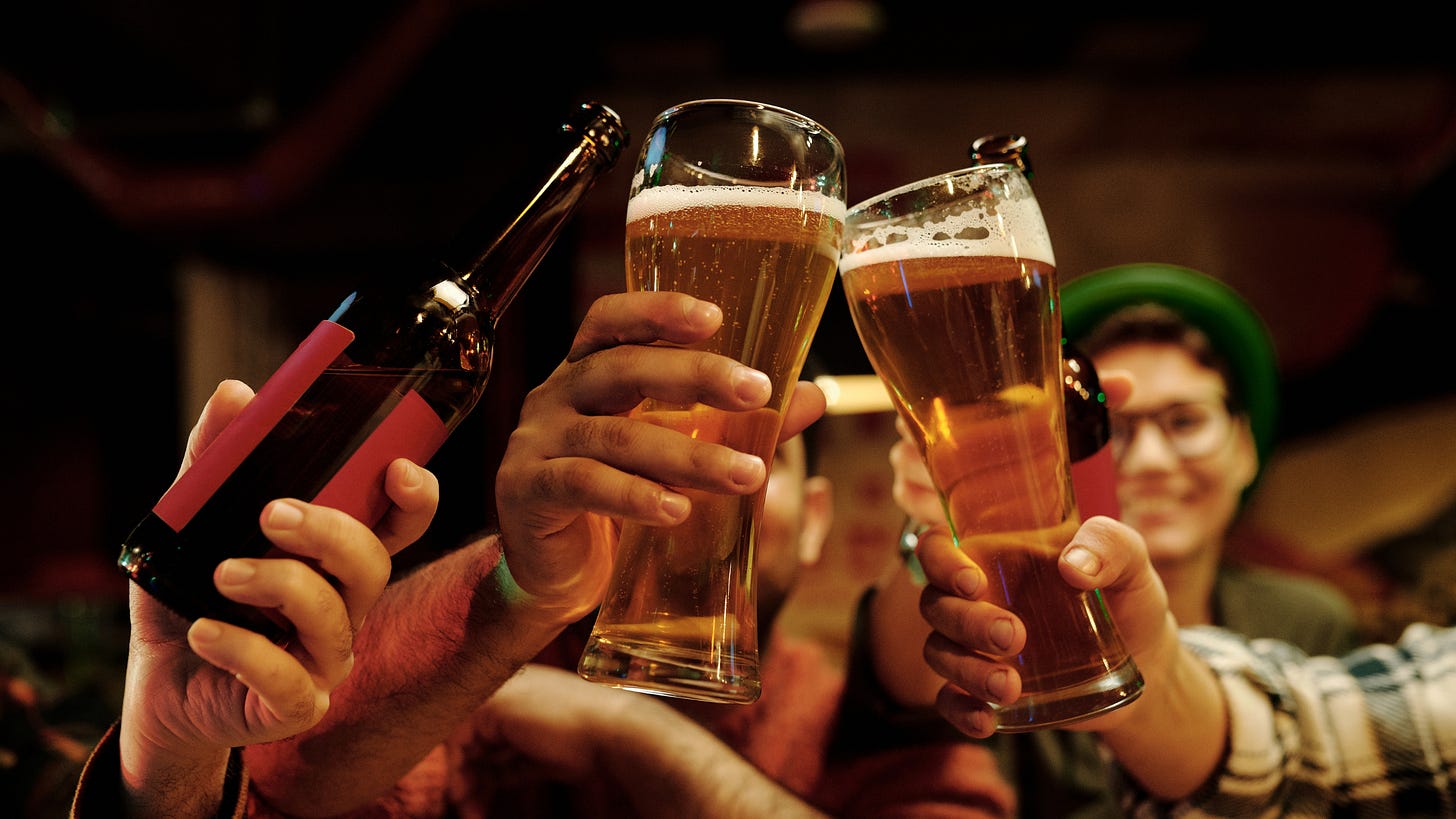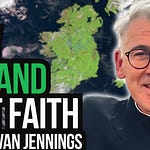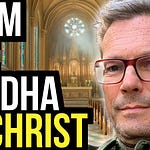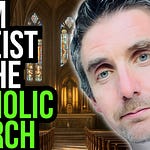I finally got to see the honourable Dr Jordan Peterson live in the flesh in Dublin last Sunday night in the 3 arena. Around 13,000 people went, sacrificing their time on a Sunday evening to listen to a Canadian Clinical psychologist talk about play, meaning, and God. Not the most standard of Irish things to do on a Sunday evening? And perhaps a sign our buttoned-down Irish attitude is changing.
At the end of his talk, there was a Q&A section and you could vote on the questions that you most wanted the doctor to answer? The first question was,
“What would you think of a United Ireland?” Which Peterson didn’t have much insight on sadly. The second was,
“What was it like to meet Christiano Ronaldo?” Of course. He fared better with this one, but it was the third question which was written in the first person and really piqued my interest:
“I’m a 30-something-year-old Irish person, who’s trying to stop binge drinking but I can’t, what should I do?” There were hundreds of questions submitted, possibly thousands, and out of all of them, this was the third most desired by all the people in the 3 arena that night? Clearly, not being able to stop drinking when you really should, had struck a nerve.
Peterson went on to tell the story of how at the age of 27 he decided to stop drinking, mainly because he realised that almost all of his poor decisions were made while drinking and that he couldn’t edit his first book ‘Maps of Meaning’ while hungover. Peterson made a rational argument against alcohol. It is the cause of 50% of murders, 50% of homicides, 50% of domestic abuse cases, rapes, and driving accidents. If you eliminated alcohol, you would save a lot of lives and suffering. Then, of course, there are the personal side effects, alcohol is involved in 50% of cancers, and it is water-soluble so breaks through the blood-brain barrier and can get into every cell in the human body - But why do facts like these never sway us to stop drinking? Probably because they don’t offer an alternative to the core benefit of drinking which is class.
Peterson, ever the contrarian, affirmed the conflict in the questioner,
“I loved drinking,” He said, somewhat tongue in cheek, “Right now I could have a bottle of Vodka or a Burbon and have a gay-old-time.”
You could tell from how he spoke, that quitting drinking was a sacrifice for him and a tough one. In his words, he lost a certain ‘Dionysian spirit’ which he never got back by quitting drinking, and that seemed to sadden him. He also pointed out that being a ‘boring tee-toller’ who moralises to everybody about drinking wasn’t the answer either. So what are we to do? Stuck between a rock and a hard place, to drink or not to drink? That is the question. Why do we drink in the first place?
My favourite thing about drinking is what Seneca, the great Stoic Philosopher, wrote about:
“At times we ought to drink even to intoxication, not so as to drown, but merely to dip ourselves in wine, for wine washes away troubles and dislodges them from the depths of the mind and acts as a remedy to sorrow as it does to some diseases.”
Alcohol can bring about a carefree, unthinking state, returning us to the Garden of Eden and solving the problem of self-consciousness. However, Seneca also pointed out, that drinking often goes too far and says:
“Drunkenness is nothing but voluntary madness.”
I never really managed to get the balance right, but certainly felt the redemptive benefit of drinking and the feeling of non-being which we human beings so desperately crave. During a recent podcast with Dr Anna Lembke, an addiction specialist, she made the point that addictions get us into this state of non-being and fix the problem of our pesky self-consciousness - it seems for humans relief from self-consciousness is not optional, but there are certainly good ways and bad ways to do so.
How Do We Stop Drinking?
Currently, I’m 9 months off the drink myself, heading for a full year after a couple of stints of six months and feel, for the first time in my life, capable of looking back on drinking and seeing what that was all about.
The biggest challenge people say to me in quitting drinking is what to do with their time? When you see friends, you drink, when you are bored, you drink, when you have time off, you drink, when life is bad, you drink, when life is good, you drink? Drinking plugs all the gaps, it’s the catch-all solution to boredom and purposelessness but that can quickly become a bad habit, and even worse, a way of life because as JP writes, drinking makes the problem it claims to solve. This paragraph is quite long but deeply relevant and important for the topic:
“Imagine a person who enjoys alcohol, perhaps a bit too much. He has a quick three or four drinks. His blood alcohol level spikes sharply. This can be extremely exhilarating, particularly for someone who has a genetic predisposition to alcoholism. But it only occurs while blood alcohol levels are actively rising, and that only continues if the drinker keeps drinking. When he stops, not only does his blood alcohol level plateau and then start to sink, but his body begins to produce a variety of toxins, as it metabolizes the ethanol already consumed. He also starts to experience alcohol withdrawal, as the anxiety systems that were suppressed during intoxication start to hyper-respond. A hangover is alcohol withdrawal (which quite frequently kills withdrawing alcoholics), and it starts all too soon after drinking ceases. To continue the warm glow, and stave off the unpleasant aftermath, the drinker may just continue to drink, until all the liquor in his house is consumed, the bars are closed and his money is spent. The real trouble starts when he discovers that his hangover can be “cured” with a few more drinks the morning after. Such a cure is, of course, temporary. It merely pushes the withdrawal symptoms a bit further into the future. But that might be what is required, in the short term, if the misery is sufficiently acute. So now he has learned to drink to cure his hangover. When the medication causes the disease, a positive feedback loop has been established.”
Drinking makes the anxiety and self-consciousness it claims to solve worse. Alcohol creates a positive feedback cycle (that is not so positive): you drink to kill negative emotion and in turn, the drinking creates more negative emotion, so you drink more to kill more negative emotion and on ad infinitum. And if you, like me and most Irish people, have been drinking weekly or fortnightly since your early teens with no break at all, then you have never seen your adult life or identity without this feedback loop! This is quite a shocking claim. That we can’t really know ourselves until we take a break from drinking.
Sacrifice Drinking For Something Better.
What is contained in Dr Peterson’s story, is that he quit drinking for his book and for his family, and that the solution to quitting drinking is that you have to sacrifice the drinking for something better.
Drinking is good, it’s fun, enlivening, freeing and a great time but comes at a price. Everything comes at a price, to do one thing is not to do everything else. A classic Peterson idea, everything is a sacrifice, you don’t get to choose to not make a sacrifice, but you do get to choose which sacrifice to make. Peterson decided that his work, writing a book on meaning and belief to try and understand why human beings are hell-bent on destroying each other and themselves, and also, raising his family, was more important than alcohol and the session.
I quit drinking for similar reasons. Every time I went drinking, the session reset me to a more primitive version of myself, replete with all my old bad habits, mal-formed beliefs and character flaws (perhaps that weren’t actually flaws in my character but flaws caused by drinking!) In that case, the character flaw was engaging in drinking and drunkenness while being aware of the problems that this caused for my life, work and relationships. That’s called willful ignorance. After every weekend, my life started from scratch again. Drinking made me a different person, a person who I was out-growing and who needed to be left behind for an adult person to come about. My life is now full of other pursuits that actually act as a bulwark against the session and bad behaviour which characterised my early twenties, and while I might one day drink again, I will never drink in the same way that I did then because I know now that alcohol is not a friend to be trusted.
A Better Sort of Consciousness.
What is the solution to the benefits of drinking? I’ve certainly learned a thing or two about a thing or to and how to feel good without drinking:
1). Getting into the flow state. I used to get into the flow state drinking 12 pints of Guinness in the pub, but there are other ways, better ways! The Flow state is very similar to being drunk, with no self-consciousness, fear, and lots of positive emotion. However, there are bad flow states and good flow states. Scrolling Tik Tok gets you into a flow state but leaves you used up and depleted. Again, flow is a finite thing, so ‘flow wisely’ as Canadian Cognitive Scientist John Vervaeke says. He also says you can tell how much meaning a person has in their life by how much flow they are experiencing day to day. More flow equals more meaning.
2) Finding your flow activities: What get’s each person into a flow state is going to be different. For me it is writing, podcasting, martial arts, conversation etc these things are deeply rooted in me and I’ve practised them for a long time. However, learning how to initiate a flow state in one arena, say martial arts, can help you initiate a flow state in other arenas! The skill is transferable. So even getting into flow itself is a skill you can learn. Find your flow activities and then begin to explore how you can bring that state into other arenas. One example would be, that podcasting gets me into a flow state, so how can I have more of these types of conversations in my normal socialising? Instead of looking at socialising as a winning and losing social game, I’ve changed to look at it like how I consider my podcast conversations, an opportunity for growth and discovery and fundamentally, a kind of play.
3) Embodying the spirit of play: Something Peterson kept saying in his talk that was a bit mysterious was that the spirit of play was the antidote to the suffering and malevolence of life. He referenced a bible quote to that effect:
At that time the disciples came to Jesus and asked, "Who is the greatest in the kingdom of heaven?" He called a little child and had him stand among them. And he said: "I tell you the truth, unless you change and become like little children, you will never enter the kingdom of heaven. Therefore, whoever humbles himself like this child is the greatest in the kingdom of heaven.
What this quote means is we have to learn how to play again to enter the kingdom of Heaven and in some sense, I think drinking and other addictive flow activities are trying to steal our way into Heaven. They are idolatry, which is trying to squeeze the infinite out of the finite, and while the desire points to something deeper, it can become caught on the wrong object. Peterson is saying that to learn to play like a child while being a functioning adult is actually a deep moral achievement. He didn’t agree with the complete Dionysian Spirit but also the boring tee-toteller wasn’t the solution either, so this serious-play is the answer.
Alcohol is a spirit and we love to be filled with that spirit because that spirit is redemptive and reduces the burden of existence. But what is often left out, is that there are other ways to lower the burden of existence, hell to even find it meaningful, and to bring that same spirit of mischief, play and fun without a bottle. My thesis is that with a change in our attitude, focus and commitment to our flowing practises, a little courage and love to get off the session and try out a new routine, we can start to live out that spirit without stealing the fire of the gods and binge drinking every weekend (if we don’t want to).
Sober October is just around the corner and I would encourage people to try it out and see themselves without the beer Goggles, you never know, you might appreciate what you find.
(PS Monk only grows if you share, we ain’t got no algorithm here, just humans, so please consider recommending it to a friend if you like the sauce)

